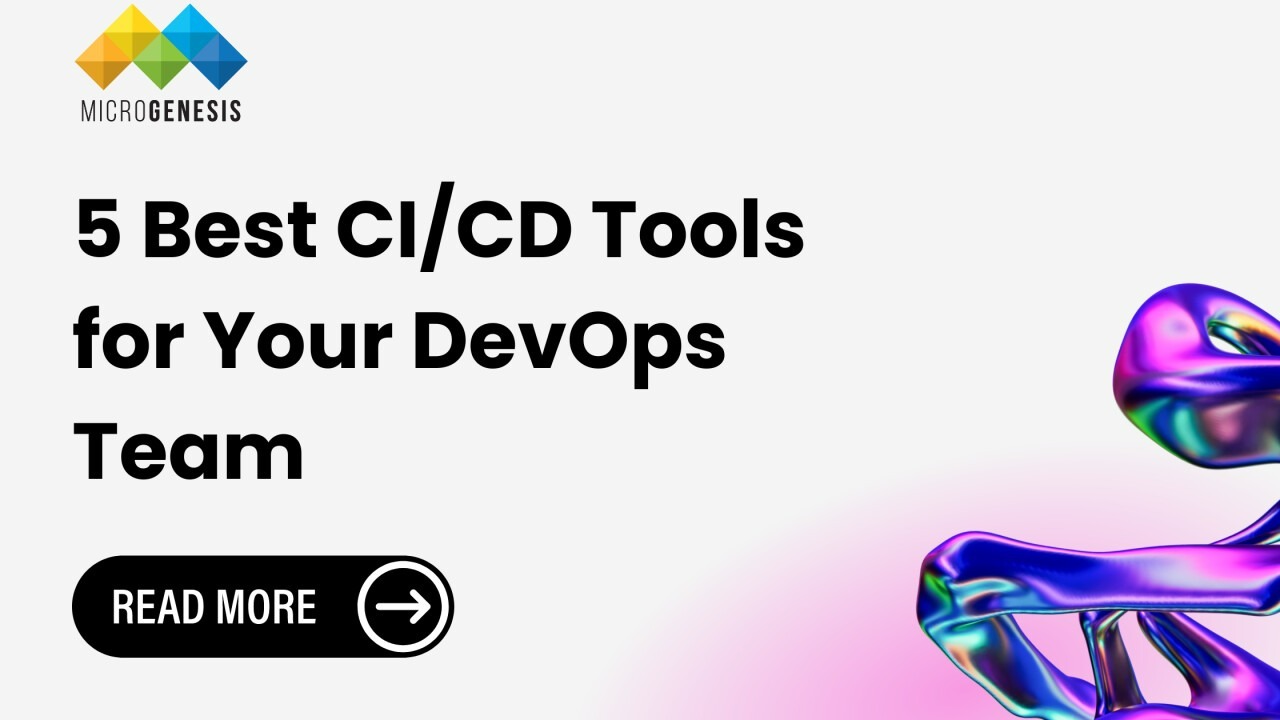Keep your keyboards steady, people! The software development world is moving swiftly.
You know how it goes – today development teams are empowered with the latest, most impressive framework, and tomorrow they may find themselves in a situation where they need to upskill and get familiar with a new technological wave. It can be bewildering sometimes, right?
But do not worry. There’s a secret weapon in the arsenal: CI CD tools.
Now, in our journey in 2024, it is necessary to acknowledge these continuous integration and deployment tools that are contributing significantly to enhancing capacity. We mean automation that will astonish you and effectiveness which will make you do a happy dance at your standing desk!
Whether you’re an accomplished DevOps team player or a cautious entrant to DevOps, we have good news (and good tools!) for everyone. Get ready with your favorite drink as we explore the best CI/CD tools in 2024! For expert assistance in selecting and implementing these tools, consult with a trusted DevOps consulting company to ensure optimal integration and performance.
To learn more about DevOps automation, click here.
What are CI CD Tools?
CI/CD tools are application programs that help in managing the process of coordinating change integration and application deployment. Continuous Integration (CI) refers to the practice of integrating small code changes by multiple authors into a common source or repository many times a day. What this does is that the new codes get tested frequently for impact and compatibility with the current codebase. The goal is to minimise the chances of integration errors so that the application is deployment-ready at any time.
Continuous Deployment (CD), meantime, applies to the release of these integrations to the production environment. So CI and CD together assist the DevOps teams to see the problems early, maintain the code quality, and enhance the speed of the software development process.
Benefits of CI/CD Tools
Adopting CI/CD tools brings numerous benefits to your development process:
- Improved Collaboration: Integrate code frequently, enabling better team collaboration and early conflict resolution.
- Faster Delivery: Reduce the time between coding and deployment with automated processes.
- Better: Continuous testing helps in finding out the problems early, making the software of better quality.
- Less Manual Work: Automation decreases the requirement for manual involvement, allowing developers to concentrate on coding.
You can understand more about DevOps automation and other aspects here.
- Increased Reliability: Consistent, automated deployments minimise human error, making releases more reliable.
5 Popular Types of CI/CD Tools
There’s a wide variety of CI/CD tools in the market, each offering unique features and benefits. Here are the top five types of CI tools that stand out in 2024:
- Best Overall CI/CD Tool: Bitbucket
- Best for Continuous Integration (CI): Bamboo
- Best for Workflow Automation: Bitbucket Pipelines
- Best for Issue Tracking: Jira Software
- Best for Documentation and Knowledge Sharing: Confluence
Let’s delve into each of the tools from our CI/CD tools list and see why they’re the best in their respective categories.
Best Overall CI/CD Tool: Bitbucket
Bitbucket is traditionally known as a tool for managing source code reps. Additionally, it has strong CI/CD features which make it the best overall option. Bitbucket also synchronises well with other Atlassian products such as Jira and Confluence to create an integrated environment for handling repositories, integrating code and deploying applications.
Features:
- Integrated CI/CD: Set up continuous integration and deployment directly within Bitbucket using Bitbucket Pipelines.
- Branch Permissions: Ensure code quality by controlling who can push to specific branches.
- Pull Requests: Facilitate code reviews and discussions, improving collaboration and code quality.
The fact that Bitbucket is an all-in-one solution combined with a simple user interface and good integration makes it a useful tool for any DevOps team.
Best for Continuous Integration: Bamboo
Bamboo, which is also from Atlassian, is very good for continuous integration. It’s created to link automated builds, tests and releases into one workflow – a perfect fit for continuous integration.
Features:
- Automated Testing: Supports automated testing, ensuring that each integration is thoroughly vetted.
- Deployment Projects: Manage and automate complex deployments with ease.
- Jira Integration: See builds and deployments in Jira.
Bamboo is great at dealing with intricate builds and deployments, and it fits in well with other Atlassian items.
Best for Workflow Automation: Bitbucket Pipelines
When it comes to automating workflows, Bitbucket Pipelines is a standout tool. It offers a straightforward yet robust method to automate the CI/CD pipeline right inside Bitbucket.
Features:
- Configuration as Code: Use a YAML file to define your pipeline configurations, making them simple to version and distribute.
- Docker Support: Use Docker containers to standardise your build environments.
- Integrated with Bitbucket: Directly link your CI/CD processes with your source code repositories.
Bitbucket Pipelines make the automation of workflows easier, minimising the extra work and intricacy usually linked with CI/CD.
Best for Issue Tracking: Jira Software
Another tool that is critical to the efficiency of any development team for tracking and management issues is Jira Software. It provides your team with a platform to seamlessly monitor your tasks and their due dates.
Features:
- Customisable Workflows: Tailor workflows to match your team’s processes.
- Real-Time Reporting: Gain insights into project progress with real-time reports and dashboards.
- Integration with Development Tools: Link issues directly with commits, branches, and pull requests.
The list of features offered by Jira software, along with its ability to seamlessly and quickly integrate with third-party apps, makes it an ideal pick for tracking issues.
Best for Documentation and Knowledge Sharing: Confluence
Keeping your team aligned in terms of knowledge and goals is extremely important. In this regard, Confluence emerges as an excellent CI CD platform for documentation and sharing knowledge. It provides a collaborative area where teams can make, distribute, and handle documents.
Features:
- Collaborative Editing: Multiple team members can edit documents simultaneously.
- Templates: Use predefined templates to create consistent, professional documentation.
- Integration with Jira: Link documentation to Jira issues for comprehensive project tracking.
Because of the way Confluence is designed, it very easily supports smooth teamwork and knowledge exchange across teams – which is a critical instrument for every DevOps group.
Dig deeper: Why DevOps is Essential for Enterprise Business Success
Use Bitbucket to Streamline DevOps Processes
Now, we can clearly say that Bitbucket is the top CI/CD tool in general. Its tie-ups with other Atlassian items like Jira and Confluence give a combined and productive development process. For enhancing your DevOps methods and achieving seamless integration, explore DevOps services that can help you implement and optimize these tools effectively. Here’s how you can apply Bitbucket to make your DevOps methods smoother:
- Bring Together Your Repositories: Get all of your source code under one hood, improve control and collaboration, and have better oversight.
- Automated CI/CD: Automate your integration and deployment task by utilising Bitbucket Pipelines – reduce the need for manual labour, and thereby the probability of minor errors.
- Track Issues Effectively: Link code changes to problems with ease by integrating Bitbucket with Jira. Make the development process easier to understand for everyone involved!
- Document Everything: Have all the knowledge at your disposal at all times – create and distribute documentation actively and share it with teams whenever required, eliminating any possible confusion.
To Conclude
Platforms like Bitbucket, Bamboo, Bitbucket Pipelines, and Jira Software provide a plethora of offerings that take care of all of your CI/CD tools needs. All of the tools discussed have their set of strengths that may suit you in different contexts – regardless, all of them are made to help you enhance your work productivity. Additionally, engaging top managed service providers can further optimize your DevOps processes, ensuring seamless integration and continuous improvement.
If you are just starting out with CI/CD or are looking to enhance your current setup, these tools could be good options to explore. They are counted among DevOps best practices. Implementing these tools with the right DevOps solutions can significantly improve your workflow and efficiency.
Ready to leverage DevOps for your organisation’s success? Contact MicroGenesis today.











